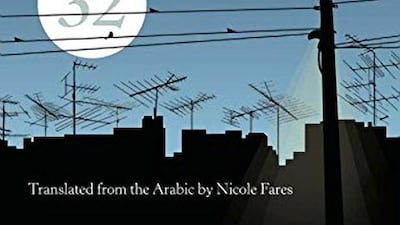Of all the things a character in a novel might do, you might imagine walking down the street is surely the most unremarkable.
Not for the narrator of Lebanese-Egyptian author Sahar Mandour's intriguing 32, which has just been published in English.
"Every day I walk by cars that I suspect are bombs and imagine them killing me," the unnamed character says about her journeys through Beirut. Then she goes out to a bar, has a mock argument with her friends about an amoeba, before enjoying a good gossip about a forthcoming wedding. 32 is that kind of book, balancing the hedonistic and the heavy.
“And that’s Beirut,” says Mandour. “It has the sea, the easiness, the opportunities and liberties, but at the same time it is polarised, anxious, on the verge of danger. Risky, fast and repetitive.”
Mandour wrote 32 in 2010 as a way of exploring her experiences in Beirut when she was in her early 30s, afraid that no one would tell the life stories of women like her in an accurate way – "our coexistence between bombs and parties", as she puts it.
It is a refreshingly modern, fast-paced novella that is as comfortable talking about female independence as it is a barroom brawl.
As such, it is a character study rather than a plot-heavy narrative, but the anonymous narrator and her friends are so thoughtful, and so much fun to be around, it is no surprise that in the introduction to the book, translator Nicole Fares says Mandour gives “voice to a post-civil-war generation”.
How does that make Mandour feel?
“Like I’m queen of the world,” she says with a laugh. “I was born in the civil war and it did shape my childhood, but not in obvious ways. Civil war is not like in the movies or photojournalism. The tears of the children, the shouting women, the torn bodies – it is all this, but civil war is mostly lived in ceasefire, when life is supposed to find a daily routine and you have this amazingly rich time of music, videos, political divas. It shaped my adolescent and adult life.
"I learnt to dream and to watch my dreams aborted in Beirut. I learnt to contain my anger, channel my feelings of injustice, be a feminist, stand up for social justice, dance on bars, read and discuss … so with 32, I wanted to produce a political document that narrates the fun we lived, the experiences that pained us, the possibilities and the impossibilities we faced."
All of which is remarkably clear in the wonderfully drawn group of friends in the book. The relationships are so vivid, it feels as if the reader is also part of the circle. They tease one another, they look out for each other, and in the experimental (but never tricksy) ending, they comment on the rest of the book.
"These friendships were the main purpose of 32," says Mandour. "I work in print journalism, and I was then the editor of the local section. I was dealing with sad and devastating news 14 hours a day and I needed to breathe. I also needed to keep a record of how people surviving the news lived in Beirut, and how lovely, real and dreamy they can be, what type of pressures they deal with."
32 is such an accessible portrait of Beirut – it does feel strange that the English-speaking world is only now getting to read it, six years after it was published in Arabic.
Thankfully, it hasn't dated at all, despite Mandour laughingly pointing out that she is now "knock knock knocking on my 40s door", and her admission that she has changed along with the city. "When I reread 32 throughout the translation process, I had smiles and tears all over my face," she says.
“It feels like a diary – not only a personal one but sociocultural, too. What I would say is that now, although Beirut is weirdly safe in this great war, you can feel how people are afraid of losing that exceptional status in a region that is falling apart.
“So it feels great but scary to have this English translation. I don’t have a clue how readers in English will feel towards my novel. I hope, of course, they love my characters, enjoy my stories, smile and maybe laugh, and take a pause to imagine a different life in an utterly different place. I’ve read a lot in English and French, and I’ve always felt you can taste a city through a novel.”
As for Beirut, Mandour says it seems different every time she thinks about it. She hopes 32 will be the gateway to other translations, particularly of Mina, her most recent novel, which expands on some of the internal feelings of the characters in 32.
There is another novel, her fifth, in the works, too, after she completes a master of arts degree at SOAS (the School of Oriental and African Studies), University of London. The city of her birth is almost certain to feature.
“I’m not done with Beirut yet,” she says. “It is an interesting city, and it is mine.”
• 32 is out now, published by Syracuse University Press
artslife@thenational.ae

